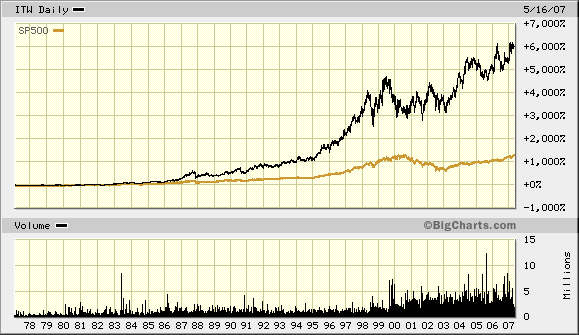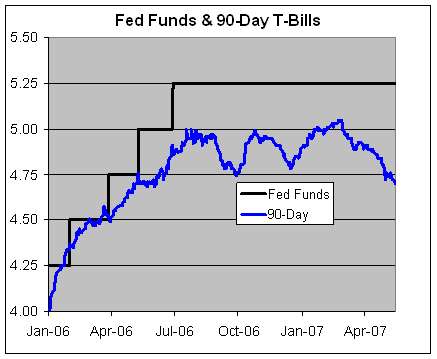Archive for May, 2007
-
Looking At the Chrysler Deal
Eddy Elfenbein, May 18th, 2007 at 10:31 amBusiness Week looks at the math of the Cerberus/Chrysler deal:
In fact, Cerberus could conceivably fetch a fat return on its money by doing very little. Consider Cerberus’ low purchase price of $7.4 billion. Lehman Brothers (LEH) analyst Brian Johnson said in a research note that at most $2.2 billion of the purchase price was for Chrysler’s carmaking operations. The other $5.2 billion or so bought Chrysler Financial Services, which made about $720 million last year and remains solidly in the black, according to Johnson.
If the restructuring moves that parent Daimler announced in February work, and Chrysler makes $1.5 billion to $2 billion in 2009 like the company said, then Cerberus makes a 68% profit on its investment over about a two-and-a-half-year period. That’s at least 27% a year from the car business. -
Illinois Tool Works
Eddy Elfenbein, May 17th, 2007 at 11:00 amHere’s another boring stock with a great long-term track record. Even the name is dull, Illinois Tool Works. But in the last 30 year, Illinois Tool Works (ITW) is up about 60-fold, including 13% this year. The shares are going for less than 14 times next year’s earnings.

-
Sign of a Top?
Eddy Elfenbein, May 16th, 2007 at 1:12 pmThere’s an old saying, “they don’t ring a bell at the top.”
But you do see this:A local man who lost his leg in a car accident has become so skilled as a stock market trader that he has managed to pay off almost all of his medical bills.
Jiang Lai was on a business trip to Huzhou, Zhejiang Province in November when the car in which he was a passenger collided with another vehicle. Jiang’s injuries were so severe that he had to have his right leg amputated.
However, neither of the two drivers accepted responsibility for the crash and hence refused to cover his medical bills, which eventually topped 100,000 yuan ($12,500).
For Jiang to be fitted with an artificial leg would cost a further 40,000 yuan.
Jiang’s parents are retired and were therefore unable to help with either the bills or to pay for a lawyer to take the case to court.
In desperation Jiang posted a message on kds.pchome.net, asking for advice and help from his fellow netizens. To his delight, he received numerous replies.
After verifying Jiang’s story, several people, mostly from the Shanghai area, started a campaign to help him. They gave advice on legal matters, recommended lawyers and even sent him books of consolation.
One of the people who made contact was a retired university professor, surnamed Yang, whom Jiang had helped in the past with a computer problem. Yang encouraged Jiang to turn his attention to the stock markets.
Over the next two months, Jiang studied all the information he could find on markets and stocks. By the end of it, he had memorised the basic information of almost all the 1,400 stocks listed on the Shanghai and Shenzhen markets.
After practicing trading for two weeks using an online simulator, Jiang decided it was time to open a live account.
On his first real trade, Jiang made just 27 yuan. It was no fortune, but it was a profit, so he withdrew the money and kept it as a souvenir.
Two months later, Jiang’s profits were starting to soar, so he set himself the goal to make enough money to pay off his medical bills.
“My earnings from the stock market have since covered the majority of my debts. I now have only 20,000 yuan left to pay,” Jiang said.
Despite making large profits, Jiang is quick to issue a word of warning to those keen to follow him: “My success on the stock market is based on my knowledge, not luck. I want to remind all new investors that the stock trading is very risky.”
He added that he regards stock trading only as a part-time job. He hopes one day to open his own teahouse. -
The Ron Paul Portfolio
Eddy Elfenbein, May 16th, 2007 at 12:38 pm
Well, he invests in what he believes. Gold. Lots and lots of gold. -
AFL-CIO Wants SEC to Make BG’s IPO DOA
Eddy Elfenbein, May 16th, 2007 at 12:31 pmIt’s official: Private Equity is the new bad boy.
A major U.S. labor group on Wednesday asked market regulators to force changes to an initial stock offering by Blackstone Group, one of the first major U.S. private equity firms to go public.
The AFL-CIO urged the Securities and Exchange Commission to require that Blackstone register as an investment company and submit to oversight under the same law mutual funds follow.
The labor federation told the SEC in a letter that it believed Blackstone “deliberately structured its public offering … to hide the fact that the Blackstone Group LP is actually an offering of interests in pools of investment securities.”
AFL-CIO Secretary-Treasurer Richard Trumka said in a statement: “That’s unacceptable, and the SEC should step in and enforce the law.” -
Citigroup’s Management Committee
Eddy Elfenbein, May 15th, 2007 at 9:57 amHere’s a look at Citigroup’s Management Committee. By my count, there are 110 members. This is essentially Citigroup’s College of Cardinals.
I have no idea how 110 people get together to run a company. Many companies aren’t that big. Nicholas Financial (NICK) only has about 200 employees total. But 110 just for a Management Committee? Where do you put all the chairs?
Interestingly, the most recent papal conclave had 115 members. -
The Bond Market Wants a Cut
Eddy Elfenbein, May 14th, 2007 at 3:31 pm
The spread between the 90-day T-bill rate and the Fed Funds rate is now at 55 basis points, which is the widest its been since the days immediately after 9/11.
The message is clear: The bond market wants a rate cut. -
DaimlerChrysler Chronology
Eddy Elfenbein, May 14th, 2007 at 12:50 pmThe AP ran this helpful chronology of the DaimlerChrysler takeover:
April 12, 1995: Kirk Kerkorian’s Tracinda Corp. makes offer for Chrysler Corp. valuing company at $22.8 billion.
Feb. 7, 1996: Chrysler makes peace deal with shareholder Kerkorian in return for stock buybacks and board seat.
Feb. 12, 1998: Daimler-Benz AG and Chrysler Corp. begin secret takeover discussions.
May 7, 1998: Daimler-Benz’s Juergen Schrempp and Chrysler Corp.’s Robert Eaton announce $36 billion takeover that creates DaimlerChrysler AG.
Nov. 17, 1998: DaimlerChrysler AG U.S. shares begin trading at $84.31 per share.
Jan. 6, 1999: DaimlerChrysler stock hits $108 per share.
Oct. 26, 2000 Chrysler posts $512 million loss for third quarter.
Oct. 30: Schrempp quoted as saying by the Financial Times he never intended a merger of equals but that it was portrayed that way “for psychological reasons.”
Nov. 17: Schrempp puts Mercedes-Benz veteran Dieter Zetsche in charge of Chrysler.
Nov. 27: Kerkorian sues company and Schrempp for $9 billion, accusing them of fraud.
Jan. 29, 2001: DaimlerChrysler announces it will cut 26,000 jobs, or about one-fifth of the work force at Chrysler and idle six plants over the next several years.
March 2001: Stock falls from more than $50 per share to roughly $38 as DaimlerChrysler grapples with weak North American and European economies.
April 2005: Cash cow Mercedes Car Group posts its first quarterly loss in more than 10 years.
April 7, 2005: Kerkorian loses his fraud suit against company.
July 28, 2005: Schrempp announces he is stepping down, with Chrysler head Zetsche to replace him on Jan. 1, 2006.
Sept. 1, 2005: Zetsche also takes over as head of Mercedes Car Group.
September 2005: Mercedes Car Group announces elimination of 8,500 jobs.
January 24, 2006: Company says it will cut 6,000 white-collar jobs worldwide — 20 percent of DaimlerChrysler’s administrative work force.
Sept. 7, 2006: United Auto Workers union refuses to grant health care concessions to Chrysler Group, even though GM and Ford got them.
Feb. 14, 2007: DaimlerChrysler says it won’t rule out “any option” including sale of Chrysler. Chrysler says it will cut 13,000 more workers. DaimlerChrysler shares rise 5 percent, to more than $67.
April 4, 2007: Zetsche says company is in talks about future of Chrysler but does not say if it will be sold.
April 5, 2007: Kerkorian’s Tracinda Corp. makes a $4.5 billion cash offer for Chrysler.
May 14, 2007: DaimlerChrysler announces end of nine-year takeover effort as it agrees to sell 80 percent of Chrysler to private equity firm Cerberus for $7.4 billion (5.5 billion euros). -
Felix Salmon Smacks Down Ben Stein
Eddy Elfenbein, May 14th, 2007 at 12:43 pmWhat does Stein mean, for instance, by this?
If oil, for example, becomes denominated in euros, the price in dollars rises — perhaps significantly.
Er, no. If Tarallucci e Vino were to start denominating the price of its cappuccinos in euros, and the dollar continued to fall, then certainly the price in dollars would rise. But that’s because cappuccino prices are fixed. Oil prices, on the other hand, are not: they change from day to day and indeed from minute to minute. At any given point in time, oil has a price in dollars, in euros, in Venezuelan bolivars, or even in pork bellies, should you be so inclined. If the dollar falls, then oil might indeed cost more dollars. But that’s got nothing to do with denomination.
-
Wall Strip Sold for $5 Million
Eddy Elfenbein, May 14th, 2007 at 11:00 amJossip is reporting that CBS is buying Wall Strip for $5 million (via Tech Dirt). Congrats to Howard, Lindsay and everyone on the Wall Strip team. Now please don’t go all corporate on us….
Here’s today’s show on American Standard:
Here’s my take on the stock.
-
-
Archives
- May 2025
- April 2025
- March 2025
- February 2025
- January 2025
- December 2024
- November 2024
- October 2024
- September 2024
- August 2024
- July 2024
- June 2024
- May 2024
- April 2024
- March 2024
- February 2024
- January 2024
- December 2023
- November 2023
- October 2023
- September 2023
- August 2023
- July 2023
- June 2023
- May 2023
- April 2023
- March 2023
- February 2023
- January 2023
- December 2022
- November 2022
- October 2022
- September 2022
- August 2022
- July 2022
- June 2022
- May 2022
- April 2022
- March 2022
- February 2022
- January 2022
- December 2021
- November 2021
- October 2021
- September 2021
- August 2021
- July 2021
- June 2021
- May 2021
- April 2021
- March 2021
- February 2021
- January 2021
- December 2020
- November 2020
- October 2020
- September 2020
- August 2020
- July 2020
- June 2020
- May 2020
- April 2020
- March 2020
- February 2020
- January 2020
- December 2019
- November 2019
- October 2019
- September 2019
- August 2019
- July 2019
- June 2019
- May 2019
- April 2019
- March 2019
- February 2019
- January 2019
- December 2018
- November 2018
- October 2018
- September 2018
- August 2018
- July 2018
- June 2018
- May 2018
- April 2018
- March 2018
- February 2018
- January 2018
- December 2017
- November 2017
- October 2017
- September 2017
- August 2017
- July 2017
- June 2017
- May 2017
- April 2017
- March 2017
- February 2017
- January 2017
- December 2016
- November 2016
- October 2016
- September 2016
- August 2016
- July 2016
- June 2016
- May 2016
- April 2016
- March 2016
- February 2016
- January 2016
- December 2015
- November 2015
- October 2015
- September 2015
- August 2015
- July 2015
- June 2015
- May 2015
- April 2015
- March 2015
- February 2015
- January 2015
- December 2014
- November 2014
- October 2014
- September 2014
- August 2014
- July 2014
- June 2014
- May 2014
- April 2014
- March 2014
- February 2014
- January 2014
- December 2013
- November 2013
- October 2013
- September 2013
- August 2013
- July 2013
- June 2013
- May 2013
- April 2013
- March 2013
- February 2013
- January 2013
- December 2012
- November 2012
- October 2012
- September 2012
- August 2012
- July 2012
- June 2012
- May 2012
- April 2012
- March 2012
- February 2012
- January 2012
- December 2011
- November 2011
- October 2011
- September 2011
- August 2011
- July 2011
- June 2011
- May 2011
- April 2011
- March 2011
- February 2011
- January 2011
- December 2010
- November 2010
- October 2010
- September 2010
- August 2010
- July 2010
- June 2010
- May 2010
- April 2010
- March 2010
- February 2010
- January 2010
- December 2009
- November 2009
- October 2009
- September 2009
- August 2009
- July 2009
- June 2009
- May 2009
- April 2009
- March 2009
- February 2009
- January 2009
- December 2008
- November 2008
- October 2008
- September 2008
- August 2008
- July 2008
- June 2008
- May 2008
- April 2008
- March 2008
- February 2008
- January 2008
- December 2007
- November 2007
- October 2007
- September 2007
- August 2007
- July 2007
- June 2007
- May 2007
- April 2007
- March 2007
- February 2007
- January 2007
- December 2006
- November 2006
- October 2006
- September 2006
- August 2006
- July 2006
- June 2006
- May 2006
- April 2006
- March 2006
- February 2006
- January 2006
- December 2005
- November 2005
- October 2005
- September 2005
- August 2005
- July 2005
 Eddy Elfenbein is a Washington, DC-based speaker, portfolio manager and editor of the blog Crossing Wall Street. His
Eddy Elfenbein is a Washington, DC-based speaker, portfolio manager and editor of the blog Crossing Wall Street. His